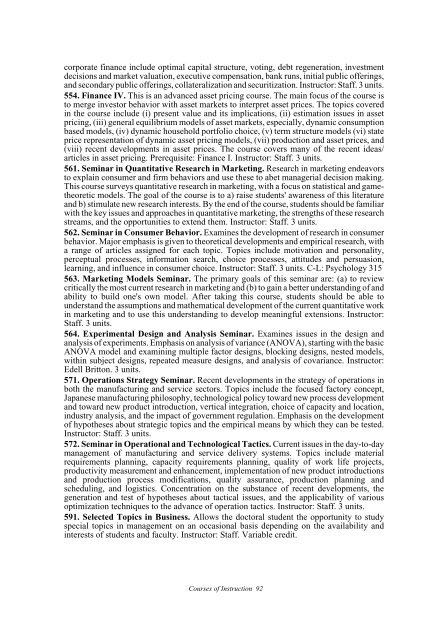Duke University 2008-2009 - Office of the Registrar - Duke University
Duke University 2008-2009 - Office of the Registrar - Duke University
Duke University 2008-2009 - Office of the Registrar - Duke University
You also want an ePaper? Increase the reach of your titles
YUMPU automatically turns print PDFs into web optimized ePapers that Google loves.
corporate finance include optimal capital structure, voting, debt regeneration, investment<br />
decisions and market valuation, executive compensation, bank runs, initial public <strong>of</strong>ferings,<br />
and secondary public <strong>of</strong>ferings, collateralization and securitization. Instructor: Staff. 3 units.<br />
554. Finance IV. This is an advanced asset pricing course. The main focus <strong>of</strong> <strong>the</strong> course is<br />
to merge investor behavior with asset markets to interpret asset prices. The topics covered<br />
in <strong>the</strong> course include (i) present value and its implications, (ii) estimation issues in asset<br />
pricing, (iii) general equilibrium models <strong>of</strong> asset markets, especially, dynamic consumption<br />
based models, (iv) dynamic household portfolio choice, (v) term structure models (vi) state<br />
price representation <strong>of</strong> dynamic asset pricing models, (vii) production and asset prices, and<br />
(viii) recent developments in asset prices. The course covers many <strong>of</strong> <strong>the</strong> recent ideas/<br />
articles in asset pricing. Prerequisite: Finance I. Instructor: Staff. 3 units.<br />
561. Seminar in Quantitative Research in Marketing. Research in marketing endeavors<br />
to explain consumer and firm behaviors and use <strong>the</strong>se to abet managerial decision making.<br />
This course surveys quantitative research in marketing, with a focus on statistical and game<strong>the</strong>oretic<br />
models. The goal <strong>of</strong> <strong>the</strong> course is to a) raise students' awareness <strong>of</strong> this literature<br />
and b) stimulate new research interests. By <strong>the</strong> end <strong>of</strong> <strong>the</strong> course, students should be familiar<br />
with <strong>the</strong> key issues and approaches in quantitative marketing, <strong>the</strong> strengths <strong>of</strong> <strong>the</strong>se research<br />
streams, and <strong>the</strong> opportunities to extend <strong>the</strong>m. Instructor: Staff. 3 units.<br />
562. Seminar in Consumer Behavior. Examines <strong>the</strong> development <strong>of</strong> research in consumer<br />
behavior. Major emphasis is given to <strong>the</strong>oretical developments and empirical research, with<br />
a range <strong>of</strong> articles assigned for each topic. Topics include motivation and personality,<br />
perceptual processes, information search, choice processes, attitudes and persuasion,<br />
learning, and influence in consumer choice. Instructor: Staff. 3 units. C-L: Psychology 315<br />
563. Marketing Models Seminar. The primary goals <strong>of</strong> this seminar are: (a) to review<br />
critically <strong>the</strong> most current research in marketing and (b) to gain a better understanding <strong>of</strong> and<br />
ability to build one's own model. After taking this course, students should be able to<br />
understand <strong>the</strong> assumptions and ma<strong>the</strong>matical development <strong>of</strong> <strong>the</strong> current quantitative work<br />
in marketing and to use this understanding to develop meaningful extensions. Instructor:<br />
Staff. 3 units.<br />
564. Experimental Design and Analysis Seminar. Examines issues in <strong>the</strong> design and<br />
analysis <strong>of</strong> experiments. Emphasis on analysis <strong>of</strong> variance (ANOVA), starting with <strong>the</strong> basic<br />
ANOVA model and examining multiple factor designs, blocking designs, nested models,<br />
within subject designs, repeated measure designs, and analysis <strong>of</strong> covariance. Instructor:<br />
Edell Britton. 3 units.<br />
571. Operations Strategy Seminar. Recent developments in <strong>the</strong> strategy <strong>of</strong> operations in<br />
both <strong>the</strong> manufacturing and service sectors. Topics include <strong>the</strong> focused factory concept,<br />
Japanese manufacturing philosophy, technological policy toward new process development<br />
and toward new product introduction, vertical integration, choice <strong>of</strong> capacity and location,<br />
industry analysis, and <strong>the</strong> impact <strong>of</strong> government regulation. Emphasis on <strong>the</strong> development<br />
<strong>of</strong> hypo<strong>the</strong>ses about strategic topics and <strong>the</strong> empirical means by which <strong>the</strong>y can be tested.<br />
Instructor: Staff. 3 units.<br />
572. Seminar in Operational and Technological Tactics. Current issues in <strong>the</strong> day-to-day<br />
management <strong>of</strong> manufacturing and service delivery systems. Topics include material<br />
requirements planning, capacity requirements planning, quality <strong>of</strong> work life projects,<br />
productivity measurement and enhancement, implementation <strong>of</strong> new product introductions<br />
and production process modifications, quality assurance, production planning and<br />
scheduling, and logistics. Concentration on <strong>the</strong> substance <strong>of</strong> recent developments, <strong>the</strong><br />
generation and test <strong>of</strong> hypo<strong>the</strong>ses about tactical issues, and <strong>the</strong> applicability <strong>of</strong> various<br />
optimization techniques to <strong>the</strong> advance <strong>of</strong> operation tactics. Instructor: Staff. 3 units.<br />
591. Selected Topics in Business. Allows <strong>the</strong> doctoral student <strong>the</strong> opportunity to study<br />
special topics in management on an occasional basis depending on <strong>the</strong> availability and<br />
interests <strong>of</strong> students and faculty. Instructor: Staff. Variable credit.<br />
Courses <strong>of</strong> Instruction 92









